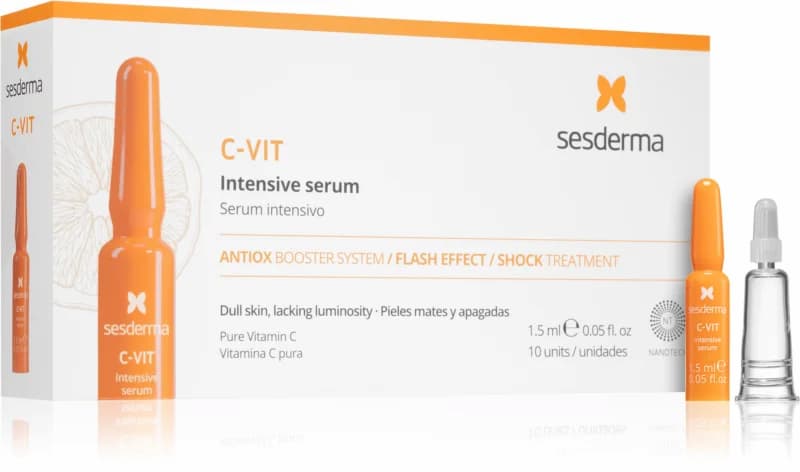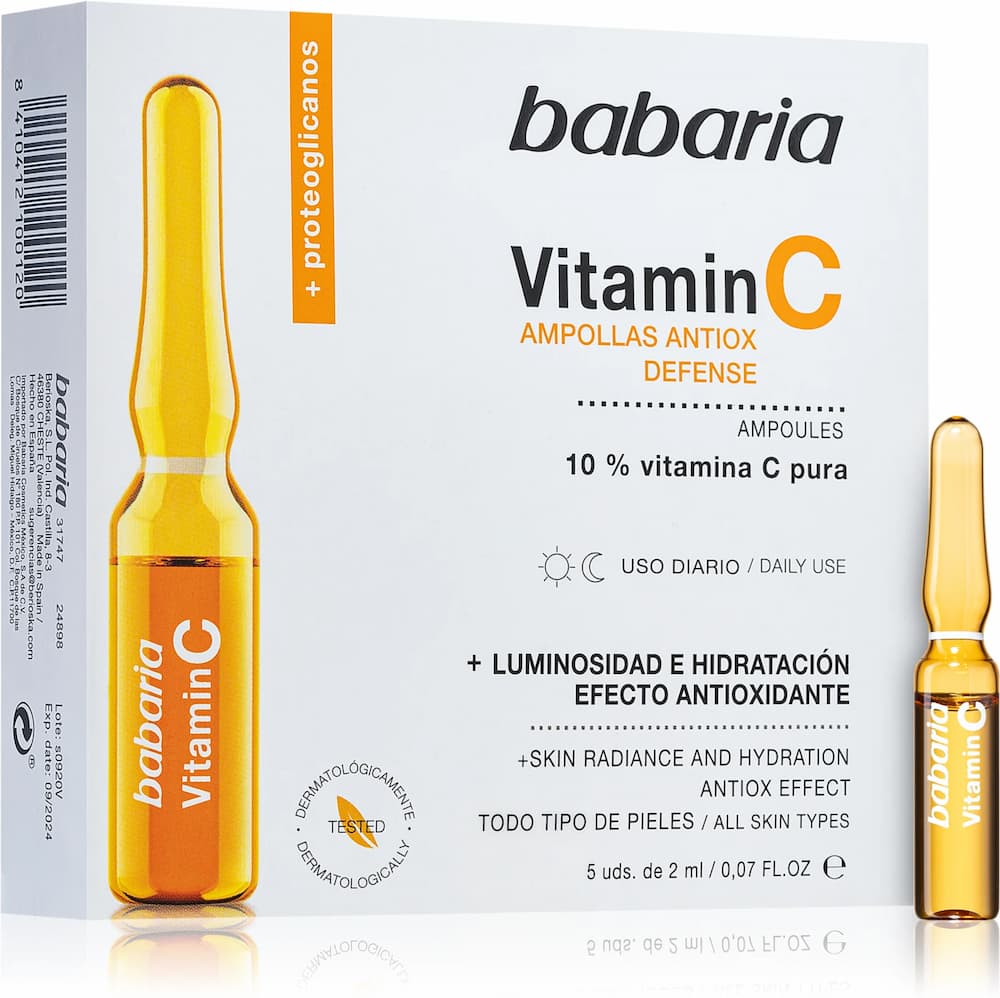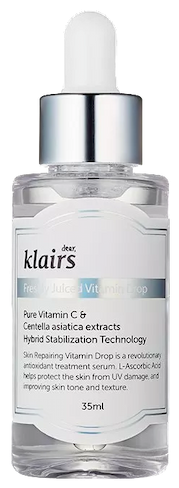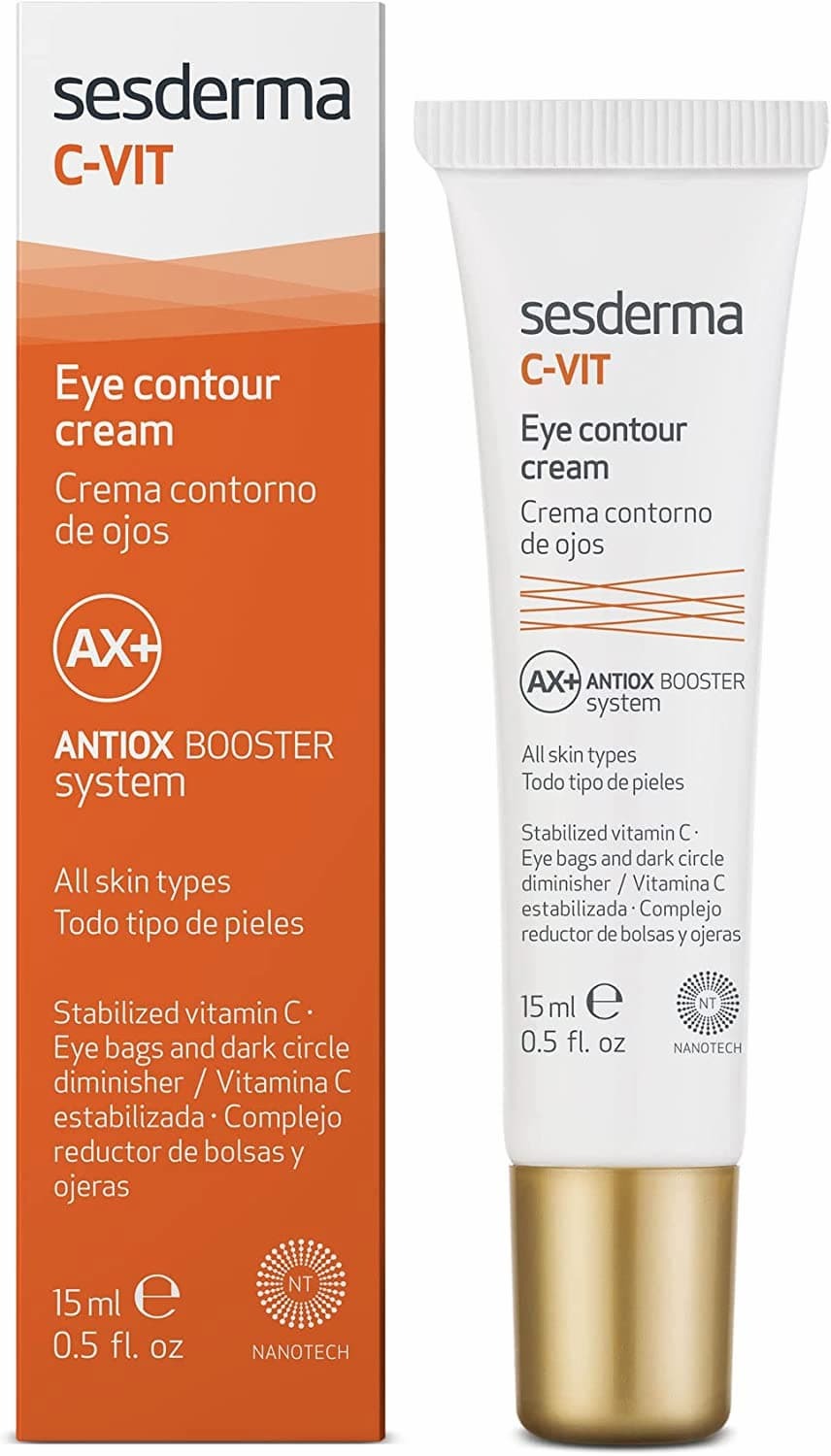Vitamin C for the face: effects, for hyperpigmentation, for acne
See what using vitamin C on your face gives you and what to keep in mind when including it in your skincare routine.


Learn more about our editorial process
.

Learn more about our editorial process
.

Learn more about our editorial process
.

Learn more about our editorial process
.
Why you can trust us
Articles on Natu.Care are written based on scientific research, data from government websites and other reliable sources. The texts are written in cooperation with doctors, nutritionists and other health and beauty experts. Articles are reviewed before publication and during significant updates.
.Learn more about our editorial process
.Information about advertisements
Content on Natu.Care may contain links to products from the sale of which we may receive a commission. When creating content, we adhere to high editorial standards and take care to be objective about the products discussed. The presence of affiliate links is not dictated by our partners, and we select the products we review ourselves completely independently.
.Learn more about our terms and Conditions
.Even children know that vitamin C is taken for immunity. And that it is in lemons. But this vitamin is more than grandma's cold remedy. As an active ingredient in cosmetics, for example, it will help you take care of your facial skin.
Ascorbic acid has been in the news in cosmetics because it has a depigmenting effect and thanks to it, quality cheeses can diminish discolouration. But that is not all this citrus vitamin has to offer.
From this article you will learn:
- What vitamin C can do for your complexion.
- Why external application is good for your skin.
- How to use cosmetics with vitamin C to be effective and safe.
- How to use cosmetics with vitamin C to be effective and safe.
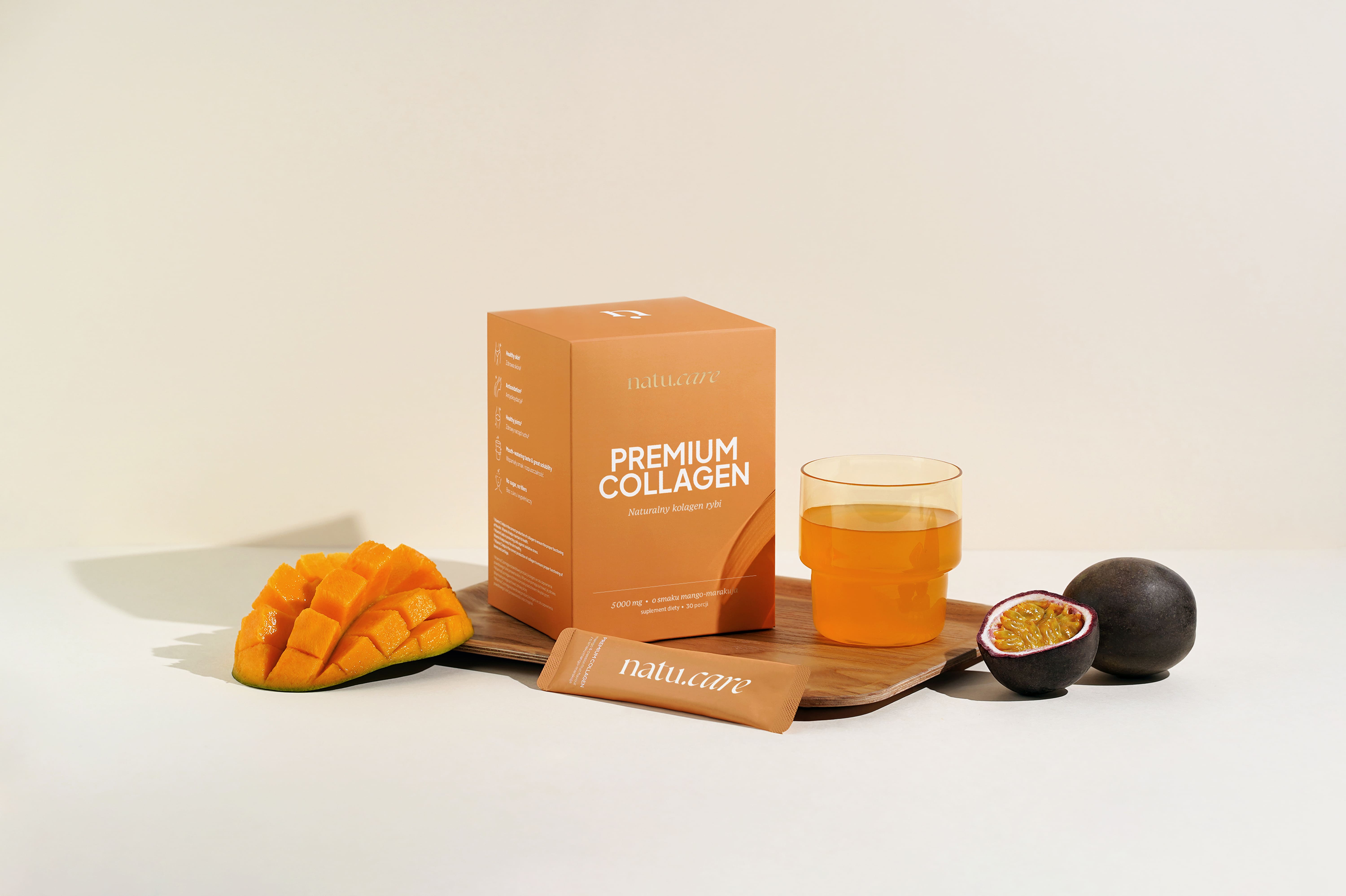
Sprawdź, za co pokochały go tysiące klientek Kolagen Premium 5000 mg, mango-marakuja
Natu.Care Kolagen Premium 5000 mg, mango-marakuja
Natu.Care Kolagen Premium dla zdrowia stawów, skóry, paznokci i włosów. Najlepsza przyswajalność. Optymalna dawka 5 000 lub 10 000 mg. Przebadany przez niezależne laboratorium.
Zobacz więcej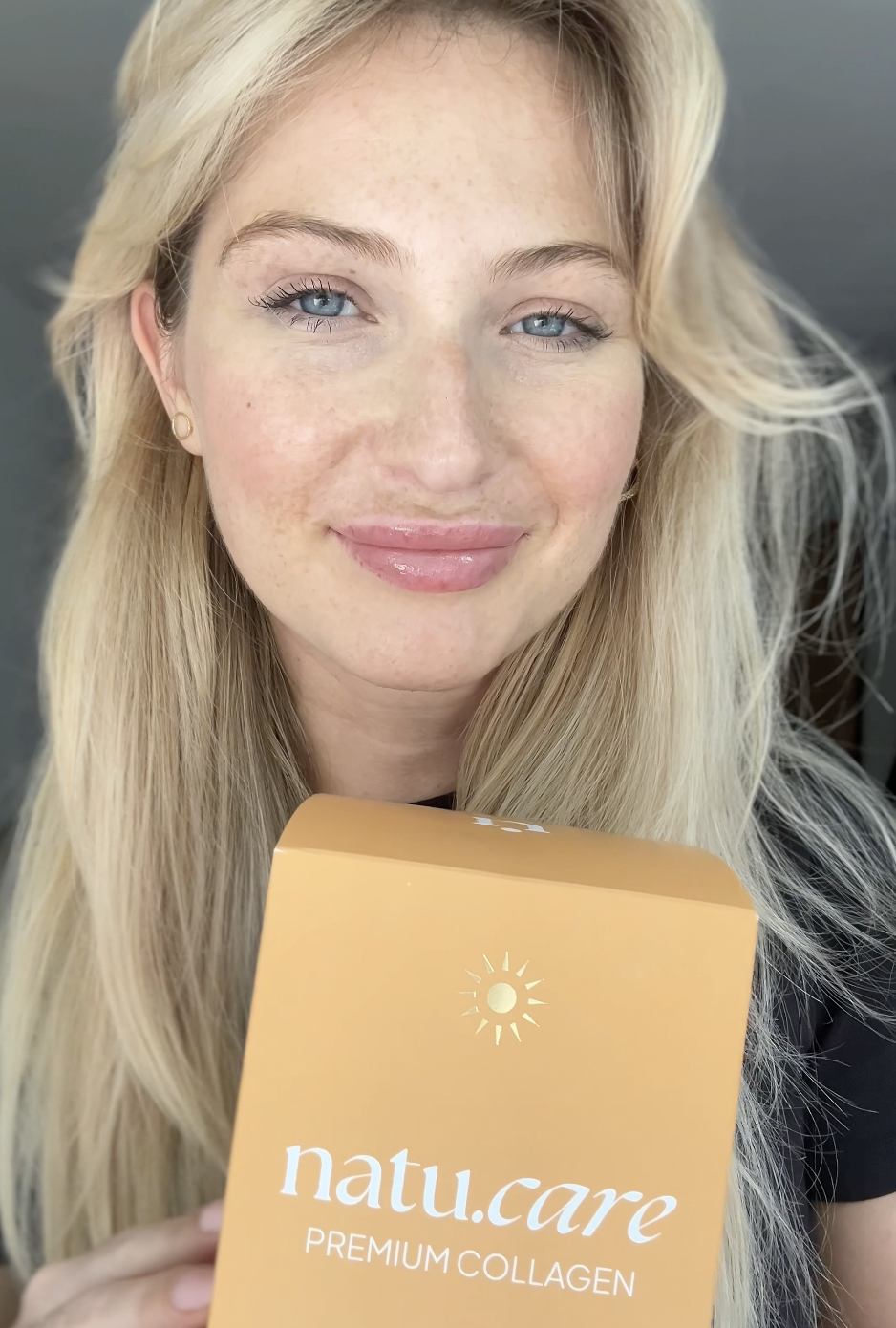
Wybrałam kolagen Natu.Care, ponieważ miał super opinie – a to było dla mnie bardzo ważne! Odkąd go stosuję, moja skóra znacznie się poprawiła i jest nawilżona, a na głowie pojawiły się nowe "baby hair".@Kasia S.
See also:
- All about vitamin C
- The best vitamin C serums
- Best anti-wrinkle cream
- Best moisturising cream
- Cerave face cream - review
- The best BB creams
- Misha BB cream - review
- Best BB creams
- Best eye creams
How does vitamin C work on facial skin?
.
The action of vitamin C on the skin, takes place on two levels:
.
Firstly, ascorbic acid is a antioxidant and inhibits tyrosinase (i.e. the formation of melanins responsible for skin pigmentation). It also influences the pigment formation process in the skin. Simply put, vitamin C displays skin toneand.
Secondly, vitamin C is involved in the formation of collagen fibres, which has an impact on skin firmness and density .
Interesting fact
Most animals can synthesise vitamin C in the body, i.e. produce it themselves. Unfortunately, humans have lost this ability over the course of evolution, so they must supply vitamin C to the body with foodand.
Effects of using vitamin C on the face
.
For most deficiency problems vitamins the answer is a healthy, varied and balanced diet, full of fruit and vegetables. However, the vitamin C provided in food reaches the skin in a very limited way.
Let's face it - vitamin C has a lot of other work to do in your body, so by the time it gets from your gut to your skin, someone is bound to get it hooked on the way (the immune system, for example).
The organism strives for homeostasis and first sends active ingredients to where they are needed most.

Marta Majszyk-Swiatek cosmetologist, technologist and Safety Assessor
That's why the best way to deliver this substance to your epidermis is with the right cosmetics. When is it worth reaching for them?
.
Vitamin C for hyperpigmentation
.
Ascorbic acid and its derivatives are one of the inhibitors of melanogenesisand. This means that it regulates the formation of melanins, the pigment in the skin responsible for its pigmentation.
Additionally, ascorbic acid reduces sun damage to skin cellsand. It is not, however, a substitute for sunscreen!
.
But note, this does not apply to the action of vitamin C derivatives that we deliver to the face with cosmetics.
Regulation of melanin formation concerns vitamin C delivered endogenously (i.e. 'from within'). Since cosmetics act "from the outside" - at the epidermal level - they have no effect on this process, as melanin is formed much deeper.

Marta Majszyk-Swiatek cosmetologist, technologist and Safety Assessor
Cosmetics, however, will help you to lighten existing hyperpigmentation and unify your skin tone for a healthy, radiant tone.
Vitamin C for acne
.
Vitamin C will also work well for acne sufferers. It helps to regulate the amount of sebum produced and prevents it from oxidising on the surface of the skin, which counteracts clogged poresand.
This will certainly be appreciated by owners of combination and oily skin, who are more prone to blemishes than other skin types.
.
Vitamin C derivatives can act on post-inflammatory hyperpigmentation in acne. Vitamin C soothes inflammatory lesions and helps the skin to regenerate faster, which has a positive effect on reducing inflammatory lesions.

Marta Majszyk-Swiatek cosmetologist, technologist and Safety Assessor
Did you know
In clinical trials, use of a vitamin C derivative twice daily reduced acne lesions compared to placeboand.
Vitamin C for scars
.
Ascorbic acid is crucial in wound healing and scar tissue formation. Vitamin C is involved in all stages of skin fusion - from inflammation through to scar formation. This is because the production of new collagen fibres depends on its levels in the bodyand.
Research shows that for wound healing and scar formation, it is particularly important to supplement vitamin C deficiencies in the diet. The key is to take it orally (with food or with dietary supplements).
Interestingly, increased intake of ascorbic acid (above the recommended level) does not result in accelerated healing. Excess vitamin C is then simply removed from the body in the urineand.
Another consideration is the use of cosmetics with vitamin C on already existing scars. This action can reduce the visibility of scars by lightening them .
See also:
.
Vitamin C for wrinkles
.
Because vitamin C is essential for the natural synthesis of collagen in your body, it can help improve skin density and reduce wrinkles. Additionally, as a powerful antioxidant it reduces skin cell damage caused by oxidative stressand.
A review of 2017 research suggests that the use of vitamin C serums can increase collagen production, resulting in skin tightening and improved appearance. This applies to sagging caused by ageing, oxidative stress or high weight lossand.
Another property of ascorbic acid for a youthful complexion is that it protects skin cells from sun damage (but not the protection that sunscreens provide). It also delays its ageing processand. And it is hard to believe that it vitamin E is called the vitamin of youth...
Vitamin C under eyes
.
The nurturing, protective and anti-ageing properties of vitamin C make it ideal for use on the delicate skin under the eyes. The additional vascular sealing and strengthening action will also help you fight dark circles and puffiness under the eyesand.
The skin under the eyes is thinner and more delicate than that on the rest of the face, so it's a good idea to choose cosmetics specifically designed for it. An ordinary cream that you use on your entire complexion can irritate these sensitive areas.
How to use vitamins under the eyes?
How to use vitamin C on the face?
.
There are several problems with the pure form of vitamin C (L-ascorbic acid) in cosmetics. Firstly, this form is unstable and does not penetrate easily into the skin. In addition, it can cause irritation in the case of sensitive skin. Therefore, you will also encounter modified forms or derivatives ofand in formulation formulations.
What to look for on the label? In cosmetics, you will most often encounter these namesand:
- magnesium ascorbyl phosphate (Magnesium Ascorbyl Phosphate),
- ascorbyl palmitate or ascorbyl tetraisopalmitate (Ascorbyl Palmitate or Tetrahexyldecyl Ascorbate),
- ascorbyl glucoside (Ascorbyl Glucoside),
- ascorbyl phosphate magnesium salt (Magnesium Ascorbyl Phosphate),
- ascorbyl phosphate sodium salt (Sodium Ascorbyl Phospate),
- 3-0 ethyl ascorbic acid (3-0-Ethyl Ascorbic Acid),
- Ascorbic acid (Ascorbic Acid),
For sensitive skins, the recommended forms are palmitate and 3-0 ethyl ascorbic acid -they are characterised by high stability, good penetration through the epidermis, and gradual release, making them safe.
Ascorbyl glucoside is milder in action than ascorbic acid, but can still irritate those with delicate skin.
For night or day?
.
Vitamin C can be used both morning and evening. Applied in the morning, it will provide the skin with protection against free radical damage. When used at night, it supports the regenerative processes. If you want to apply vitamin C once a day, choose the morning - you will reduce your skin's susceptibility to oxidative stressand.
.
For dry or wet skin?
.
In the case of ascorbic acid products, it is recommended to apply them to a dried face, as penetrating the skin too quickly and intensely can lead to irritation.
How to apply a cosmetic therefore depends on the form of vitamin C it contains and its concentration. It is best to check what application recommendations are provided by the manufacturer itself.
The best way to use a cosmetic is to check the concentration of the vitamin C it contains.
Vitamin C and the sun
.
Searching for information about vitamin C for the face, you may have come across the statement that vitamin C should not be applied in summer, during intense sun exposure of the skin. I hasten to correct this.
Most cosmetics with stable forms of vitamin C can be applied directly underneath filter cream and enjoy their antioxidant propertiesand.
.
Vitamin C for the face: in drops, in ampoules, in powder...
.
There are many types of vitamin C cosmetics that you can implement into your skincare routine. Some people even use dietary supplements, such as oral drops with vitamin C directly on the face.
Diet supplements are not tested for use on the skin. Sometimes they are not even tested for oral ingestion, which carries a high risk. You should not use products on the skin that are not designed and tested for this. This can do more harm than good.

Marta Majszyk-Swiatek cosmetologist, technologist and Safety Assessor
So don't combine with sprinkling your face with vitamin C in the form of a dietary supplement. By choosing a cosmetic, you are more likely to ensure that the form of vitamin C it contains is safe for your skin. You will also find it easier to match the right concentration for you.
Important
Beginning your skincare regimen with vitamin C, choose mild forms or lower concentrations (preferably in the 5-8% range).
Which type of cosmetic to opt for depends on your personal preferences. Vitamin C in ampoules will usually be for several days' intensive treatments.
Serums will work well as a shock dose when you want vitamin C to form the basis of your skincare. Creams work more gently and will work well for those with extremely sensitive skin. A cosmetic vitamin C powder will appeal to lovers of making their own skincare preps.
Best vitamin C facial preparations
.
Criteria for selection:
.
- Form of vitamin C - which one to choose depends on the skin type you have. The most desirable in cosmetics are ascorbyl tetraisopalmitate (Tetrahexyldecyl Ascorbate) and 3-0 Ethyl Ascorbic Acid (3-0 Ethyl Ascorbic Acid).
- Concentration - when starting vitamin C care, choose a cosmetic in which ascorbic acid is an additive or its concentration does not exceed 10%. If your skin is already familiar with the nourishing power of vitamin C, you can bet on a higher concentration, but not higher than 20%.
- Additional active ingredients - the combination of vitamin C with other antioxidants intensifies its effects.
Vitamin C ampoules
.
Sesderma C-VIT Intensive serum
Product description
Intensive treatment to give the skinós radiance and ensure it is well hydrated. Lightens hyperpigmentation and strengthens the walls of blood vessels, preventing the formation of unsightly spideróveins.
Fit for a quick facial revitalisation before an important event.
Work well as a quick facial revitalisation before an important outing.
.Pros and cons
Intensive treatment to give the skinós radiance and ensure it is well hydrated. Lightens hyperpigmentation and strengthens the walls of blood vessels, preventing the formation of unsightly spideróveins.
Fit for a quick facial revitalisation before an important event.
Work well as a quick facial revitalisation before an important outing.
.Additional information
Intensive treatment to give the skinós radiance and ensure it is well hydrated. Lightens hyperpigmentation and strengthens the walls of blood vessels, preventing the formation of unsightly spideróveins.
Fit for a quick facial revitalisation before an important event.
Work well as a quick facial revitalisation before an important outing.
.User review
Intensive treatment to give the skinós radiance and ensure it is well hydrated. Lightens hyperpigmentation and strengthens the walls of blood vessels, preventing the formation of unsightly spideróveins.
Fit for a quick facial revitalisation before an important event.
Work well as a quick facial revitalisation before an important outing.
.barbaria Vitamin C
Product description
Five-day illuminating treatment for the face, neck and décolleté. Give your complexion a radiant glow and supportóy anti-ageing protection. Thanks to the depigmenting properties of vitamin C, the ampoules will help you to even out your skin tone.
Pros and cons
Five-day illuminating treatment for the face, neck and décolleté. Give your complexion a radiant glow and supportóy anti-ageing protection. Thanks to the depigmenting properties of vitamin C, the ampoules will help you to even out your skin tone.
Additional information
Five-day illuminating treatment for the face, neck and décolleté. Give your complexion a radiant glow and supportóy anti-ageing protection. Thanks to the depigmenting properties of vitamin C, the ampoules will help you to even out your skin tone.
Five-day illuminating treatment for the face, neck and décolleté. Give your complexion a radiant glow and supportóy anti-ageing protection. Thanks to the depigmenting properties of vitamin C, the ampoules will help you to even out your skin tone.
Vitamin C serum
.
Klairs Freshly Juiced Vitamin Drop
Product description
The Klairs Freshly Juiced Vitamin Drop serum with vitamin C is based on natural ingredients, intensely moisturises, regenerates and refreshes the skinóhand. The formula helps to nourish and visually rejuvenate the skin.
.It will work even for sensitive skin. Klairs Freshly Juiced Vitamin Drop Serum with Vitamin C will make the skin radiant, healthier, the tone will be even and the appearance of pores will be reduced.
Serum from Klairs will nourish the complexion.
Serum from Klairs is recommended for those new to such cosmetics. The five per cent concentration of vitamin C is safe for most of us.
Pros and cons
The Klairs Freshly Juiced Vitamin Drop serum with vitamin C is based on natural ingredients, intensely moisturises, regenerates and refreshes the skinóhand. The formula helps to nourish and visually rejuvenate the skin.
.It will work even for sensitive skin. Klairs Freshly Juiced Vitamin Drop Serum with Vitamin C will make the skin radiant, healthier, the tone will be even and the appearance of pores will be reduced.
Serum from Klairs will nourish the complexion.
Serum from Klairs is recommended for those new to such cosmetics. The five per cent concentration of vitamin C is safe for most of us.
Additional information
The Klairs Freshly Juiced Vitamin Drop serum with vitamin C is based on natural ingredients, intensely moisturises, regenerates and refreshes the skinóhand. The formula helps to nourish and visually rejuvenate the skin.
.It will work even for sensitive skin. Klairs Freshly Juiced Vitamin Drop Serum with Vitamin C will make the skin radiant, healthier, the tone will be even and the appearance of pores will be reduced.
Serum from Klairs will nourish the complexion.
Serum from Klairs is recommended for those new to such cosmetics. The five per cent concentration of vitamin C is safe for most of us.
The Klairs Freshly Juiced Vitamin Drop serum with vitamin C is based on natural ingredients, intensely moisturises, regenerates and refreshes the skinóhand. The formula helps to nourish and visually rejuvenate the skin.
.It will work even for sensitive skin. Klairs Freshly Juiced Vitamin Drop Serum with Vitamin C will make the skin radiant, healthier, the tone will be even and the appearance of pores will be reduced.
Serum from Klairs will nourish the complexion.
Serum from Klairs is recommended for those new to such cosmetics. The five per cent concentration of vitamin C is safe for most of us.
Product description
Serum with the most effective form of vitamin C in its composition. The product is suitable for people with sensitive, vascular or dry skin. The cosmetic is supplemented with vitamin E and jojoba oil. These ingredients moisturise the skin and vitamin E additionally protects the skin from damage.
.Pros and cons
Serum with the most effective form of vitamin C in its composition. The product is suitable for people with sensitive, vascular or dry skin. The cosmetic is supplemented with vitamin E and jojoba oil. These ingredients moisturise the skin and vitamin E additionally protects the skin from damage.
.Additional information
Serum with the most effective form of vitamin C in its composition. The product is suitable for people with sensitive, vascular or dry skin. The cosmetic is supplemented with vitamin E and jojoba oil. These ingredients moisturise the skin and vitamin E additionally protects the skin from damage.
.User review
Serum with the most effective form of vitamin C in its composition. The product is suitable for people with sensitive, vascular or dry skin. The cosmetic is supplemented with vitamin E and jojoba oil. These ingredients moisturise the skin and vitamin E additionally protects the skin from damage.
.Sesderma C-VIT Liposomal serum
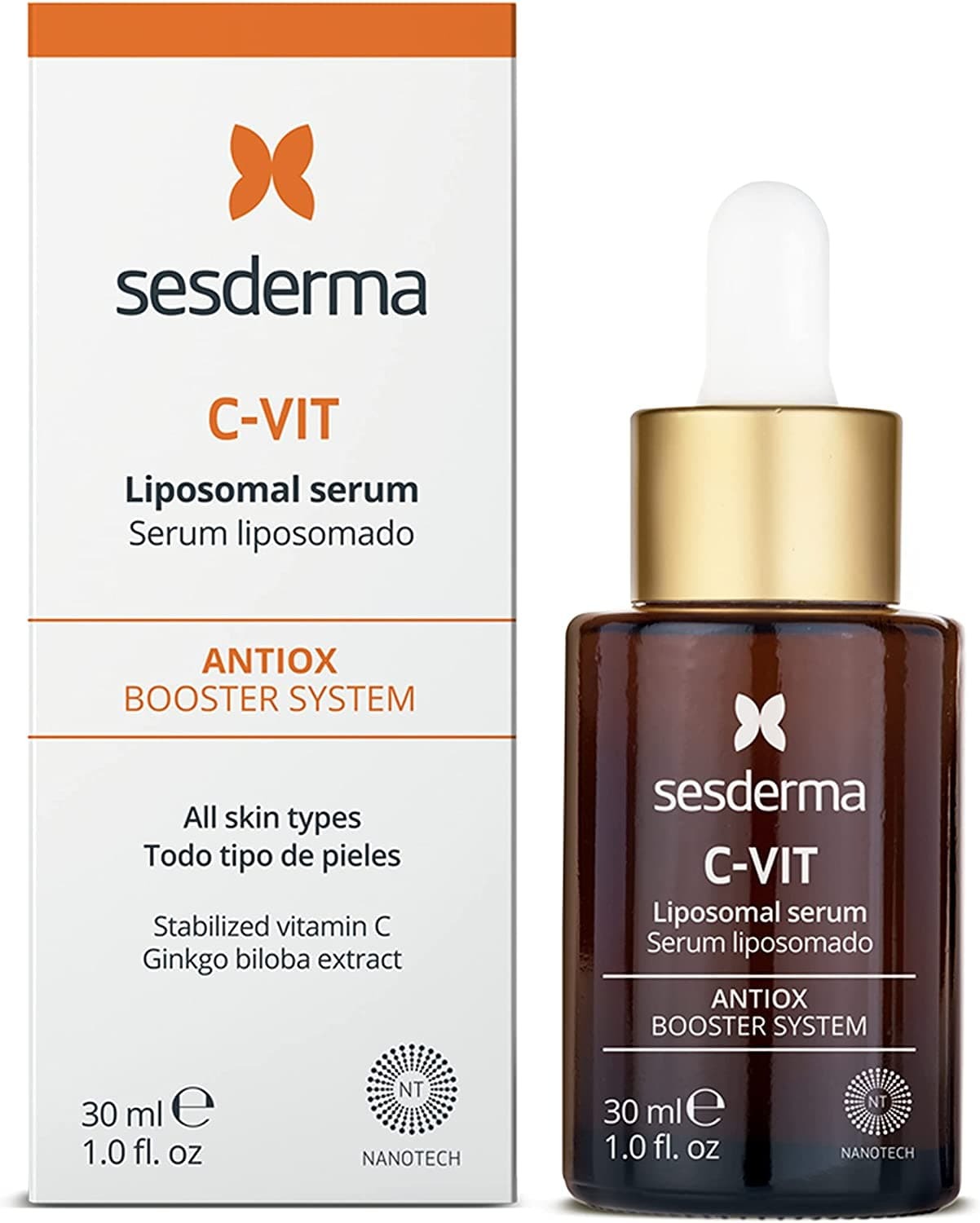
- Main active ingredients: 3-0 ethyl ascorbic acid (vitamin C), Antiox booster system, hyaluronic acid, white mulberry extract.
- Purpose: all skin types .
- Packaging: 30 ml .
Product description
Liposomal serum with vitamin C. As the cosmetologist explains, the vitamin C is encapsulated in liposomes, which has a positive effect on the penetration of the active ingredients into the skinós surface. The product moisturises and brightens and, importantly, is also suitable for people with sensitive skin. In addition, the Antiox boost system neutralises the effect of free radicals.
.Pros and cons
Liposomal serum with vitamin C. As the cosmetologist explains, the vitamin C is encapsulated in liposomes, which has a positive effect on the penetration of the active ingredients into the skinós surface. The product moisturises and brightens and, importantly, is also suitable for people with sensitive skin. In addition, the Antiox boost system neutralises the effect of free radicals.
.Additional information
Liposomal serum with vitamin C. As the cosmetologist explains, the vitamin C is encapsulated in liposomes, which has a positive effect on the penetration of the active ingredients into the skinós surface. The product moisturises and brightens and, importantly, is also suitable for people with sensitive skin. In addition, the Antiox boost system neutralises the effect of free radicals.
.User review
Liposomal serum with vitamin C. As the cosmetologist explains, the vitamin C is encapsulated in liposomes, which has a positive effect on the penetration of the active ingredients into the skinós surface. The product moisturises and brightens and, importantly, is also suitable for people with sensitive skin. In addition, the Antiox boost system neutralises the effect of free radicals.
.Vitamin C creams
.
Bielenda Energising and Moisturising Cream with Ultra-Stable Vitamin C
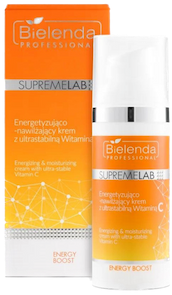
- Main active ingredients: vitamin C (ascorbyl palmitate and 3-0 Ethyl ascorbic acid), ferulic acid, Ginseng extract, carnitine, coenzyme Q10, minerals .
- Purpose: all skin types .
- Packaging: 50 ml .
Product description
Cream with a light gel texture. Thanks to its vitamin C content, it brightens the skinóhand and restores its colour. Has an antioxidant effect, giving the complexion a radiant glow. It helps in the fight against hyperpigmentation.
.The properties of vitamin C are complemented by the action of ferulic acid, whichós anti-ageing action prevents the formation of hyperpigmentation and helps lighten existing ones.
Pros and cons
Cream with a light gel texture. Thanks to its vitamin C content, it brightens the skinóhand and restores its colour. Has an antioxidant effect, giving the complexion a radiant glow. It helps in the fight against hyperpigmentation.
.The properties of vitamin C are complemented by the action of ferulic acid, whichós anti-ageing action prevents the formation of hyperpigmentation and helps lighten existing ones.
Additional information
Cream with a light gel texture. Thanks to its vitamin C content, it brightens the skinóhand and restores its colour. Has an antioxidant effect, giving the complexion a radiant glow. It helps in the fight against hyperpigmentation.
.The properties of vitamin C are complemented by the action of ferulic acid, whichós anti-ageing action prevents the formation of hyperpigmentation and helps lighten existing ones.
Cream with a light gel texture. Thanks to its vitamin C content, it brightens the skinóhand and restores its colour. Has an antioxidant effect, giving the complexion a radiant glow. It helps in the fight against hyperpigmentation.
.The properties of vitamin C are complemented by the action of ferulic acid, whichós anti-ageing action prevents the formation of hyperpigmentation and helps lighten existing ones.
iossi Velvet Rose
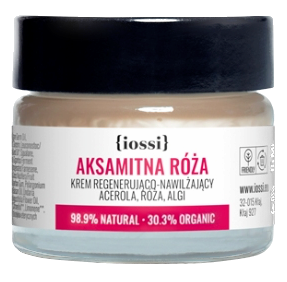
- Main active ingredients: acerola bioferment (source vitamin C), wild róve oil (source omega-3-6-9 acids), brown algae extract, B vitamins, vitamin E, carotenoids .
- Purpose: dry, mature, sensitive skin .
- Packaging: 15 ml .
Product description
In this natural cosmetic, vitamin C is contained in a bioferment from acerola and its effects are supplemented with vitamin E. A regenerating and moisturising cream with a velvety texture. It nourishes, improves the elasticity of the skinóry and helps prevent the formation of new wrinkles. Damask rórye extract has anti-ageing and antioxidant properties.
Because of its rich texture, it will be a saviour for those with dry skinóry. However, if your skin is combination or oily, it may become shiny after application.
If you have combination or oily skin, you may find that it is not as effective as this.
Pros and cons
In this natural cosmetic, vitamin C is contained in a bioferment from acerola and its effects are supplemented with vitamin E. A regenerating and moisturising cream with a velvety texture. It nourishes, improves the elasticity of the skinóry and helps prevent the formation of new wrinkles. Damask rórye extract has anti-ageing and antioxidant properties.
Because of its rich texture, it will be a saviour for those with dry skinóry. However, if your skin is combination or oily, it may become shiny after application.
If you have combination or oily skin, you may find that it is not as effective as this.
Additional information
In this natural cosmetic, vitamin C is contained in a bioferment from acerola and its effects are supplemented with vitamin E. A regenerating and moisturising cream with a velvety texture. It nourishes, improves the elasticity of the skinóry and helps prevent the formation of new wrinkles. Damask rórye extract has anti-ageing and antioxidant properties.
Because of its rich texture, it will be a saviour for those with dry skinóry. However, if your skin is combination or oily, it may become shiny after application.
If you have combination or oily skin, you may find that it is not as effective as this.
User review
In this natural cosmetic, vitamin C is contained in a bioferment from acerola and its effects are supplemented with vitamin E. A regenerating and moisturising cream with a velvety texture. It nourishes, improves the elasticity of the skinóry and helps prevent the formation of new wrinkles. Damask rórye extract has anti-ageing and antioxidant properties.
Because of its rich texture, it will be a saviour for those with dry skinóry. However, if your skin is combination or oily, it may become shiny after application.
If you have combination or oily skin, you may find that it is not as effective as this.
Product description
One of the main strengthsós of the cream is the presence of one of the most powerful antioxidantsós, namely vitamin C. Thanks to this, the preparation prevents the action of negative factorsóing the skin's ageing process.
.The combination with organic silica, orange and nostrum extracts not only gives it a beautiful citrus fragrance, but also strengthens blood vessels and reduces swelling in the eye area.
Pros and cons
One of the main strengthsós of the cream is the presence of one of the most powerful antioxidantsós, namely vitamin C. Thanks to this, the preparation prevents the action of negative factorsóing the skin's ageing process.
.The combination with organic silica, orange and nostrum extracts not only gives it a beautiful citrus fragrance, but also strengthens blood vessels and reduces swelling in the eye area.
Additional information
One of the main strengthsós of the cream is the presence of one of the most powerful antioxidantsós, namely vitamin C. Thanks to this, the preparation prevents the action of negative factorsóing the skin's ageing process.
.The combination with organic silica, orange and nostrum extracts not only gives it a beautiful citrus fragrance, but also strengthens blood vessels and reduces swelling in the eye area.
One of the main strengthsós of the cream is the presence of one of the most powerful antioxidantsós, namely vitamin C. Thanks to this, the preparation prevents the action of negative factorsóing the skin's ageing process.
.The combination with organic silica, orange and nostrum extracts not only gives it a beautiful citrus fragrance, but also strengthens blood vessels and reduces swelling in the eye area.
What not to combine vitamin C with in facial care?
.
Vitamin C is very hospitable. Most active ingredients feel great in its company. Together, they complement each other and even enhance each other's action. However, there are some that do not get on well with this vitamin. The most common form of ascorbic acid is ascorbic acidand.
.
So beware of combinations with:
.
Vitamin B3 (niacinamide)
.
Vitamins C and B3 do not like each other due to the different pH in which they feel most comfortable. Therefore, you are unlikely to find their pure forms side by side in cosmetic formulations. Combined together in skincare, they will look like two people fighting over air conditioning settings.
Applying preparations with vitamin C and niacinamide in succession can lead to irritation, as the skin does not like rapid changes in pH. In high concentrations, the combination of these substances can produce nicotinic acid, which has a highly irritating effectand. Ouch.
The situation is different, however, with vitamin C derivatives. There are now cosmetics on the market containing, for example, ascorbyl tetraisopalmitate and vitamin B3. These are most commonly formulated for acne-prone skin.
The easiest way, however, is to separate the application of these two ingredients into different times of the day.
Copper
.
If you combine antioxidant properties of copper with antioxidant properties of vitamin C, you get the properties of... prooxidantand. Yes, you're thinking right - they're the ones that accelerate cellular ageing. Oops, two minuses make a plus.
The combination of these two ingredients can also increase inflammationand. What's too much is not healthy. It's better to opt for one super-powerful antioxidant.
Retinol...?
.
The question mark was placed above not by accident. Retinol and vitamin C love and hate each other. If you apply them to your face in succession, they can neutralise each other's effectsand. Although it all depends on the forms of one and the other ingredient - there are cosmetic formulations where manufacturers have managed to combine their effects.
However, a retinol skincare regimen without a powerful antioxidant will not be complete, and may even do harm. To use ascorbic acid with a retinol treatment, apply it at a different time - it will work best in the morning, while a cosmetic with retinol should be applied in the evening.
Acids.
Acids (e.g. AHA, BHA)
.
When combining vitamin C and acids, the principle is similar to that of retinol products. Acids can neutralise the effect of ascorbic acid and its derivatives. In that case, a cosmetic with vitamin C will not work.
.
You can, however, use products with acids at a different time - preferably in the evening, and vitamin C in the morning.
Deterioration of skin after vitamin C
.
You read about the wonderful properties of vitamin C, buy a super-concentrated serum, start using it and... your skin turns the colour of a ripe tomato. Or you are covered in pimples. I know that feeling of disappointment.
Vitamin C can cause your complexion to deteriorate. The most common complications of its use are redness (irritation) and increased inflammatory lesions (a rash of pimples)and.
.
Most often this is due to an inappropriate choice of form of this vitamin or concentration. If you haven't used ascorbic acid in your skincare routine so far, start with cosmetics containing its milder derivatives. Especially if you have sensitive skin.
If you absolutely want to try pure ascorbic acid, reach for preparations in which its concentration is 5-8%. I would advise you to do this even if your skin is robust and nothing has ever irritated you before.
The next cause of irritation is the skin sensitivity.
Another cause by which we can end up with a worse looking complexion is an allergic reaction to an ingredient in a new cosmetic. To protect yourself from such surprises, when implementing a new cosmetic into your skincare routine, first apply it to a small patch of skin and see if an allergic reaction develops.
Take care of your skin's complexion.
See also:
- Vitamin C collagen
- Collagen with hyaluronic acid
- Collagen for wrinkles
- Facial collagen
- Collagen for women
- Best facial serums
- Best skincare creams
Summary
.
- Vitamin C for the face is a powerful antioxidant. It delays the ageing process, has a protective and anti-inflammatory effect.
- Ascorbic acid.
- Ascorbic acid in cosmetics is known to reduce the appearance of hyperpigmentation, brighten and even out skin tone.
- Applying vitamin C to the face will reduce cellular damage caused by sunlight (but will not replace UV sunscreen!).
- Ascorbic acid can irritate sensitive skin. For those with delicate skin, derivatives of it are recommended.
- Ascorbic acid can irritate sensitive skin.
- Beginning your vitamin C skincare regimen, choose cosmetics with its mild forms or lower concentrations.
- Do not combine pure vitamin C with niacinamide, copper, retinol and acids in a single skincare ritual.
FAQ
Can Cebion be used on the face?
Cebion is drops with vitamin C intended for oral supplementation rather than external application. Applying Cebion to the face is not in accordance with the manufacturer's recommendations and the purpose of this specific product. Simply do not do it.
Can vitamin C be used on the face during pregnancy?
Yes, pregnant women can use cosmetics with vitamin C. Applied externally, ascorbic acid remains in the skin and has no effect on the foetus.
What effects will the use of Juvit C have on the face?
We advise against the use of Juvit C for people who are starting out on skincare vitamin C. Pure ascorbic acid can act as an irritant. The result? You could end up with a face irritated to the point of redness.
What are the benefits of using vitamin C on the face?
Vitamin C applied to the face will help eliminate hyperpigmentation and prevent new ones from forming. It has a brightening effect and makes the complexion radiant. Ascorbic acid and its derivatives have anti-inflammatory and antioxidant properties. To enhance the effects of the treatment, look for cosmetics in which vitamin C is combined with vitamin E.
Can the vitamin C serum be used daily?
Yes, vitamin C serum can be used daily or even twice a day. Such cosmetics can be applied both in the morning and in the evening provided that the form ascorbic acid is stable.
What to put on vitamin C?
The final step in skincare should always be sunscreen cosmetics. Applied over a product with vitamin C it will perfectly complement its photoprotective effect. With such care, you will protect your skin cells from damage caused by UVB and UVA radiation.
Do you need to use sunscreen with vitamin C?
Yes. Vitamin C protects facial skin from photo-ageing and reduces cell damage from prolonged sun exposure, but does not block UVA and UVB radiation. This is the role of screen creams. To fully protect your skin from sunburn and accelerated ageing, apply a product with SPF as the last step in your skincare regimen.
.
Resources
See all
Al-Niaimi, F., & Chiang, N. Y. Z. (2017). Topical Vitamin C and the Skin: Mechanisms of Action and Clinical Applications. The Journal of Clinical and Aesthetic Dermatology, 10(7), 14-17. https://www.ncbi.nlm.nih.gov/pmc/articles/PMC5605218/
Boo, Y. C. (2022). Ascorbic Acid (Vitamin C) as a Cosmeceutical to Increase Dermal Collagen for Skin Anti-Aging Purposes: Emerging Combination Therapies. Antioxidants, 11(9), Article 9. https://doi.org/10.3390/antiox11091663
Caritá, A. C., Fonseca-Santos, B., Shultz, J. D., Michniak-Kohn, B., Chorilli, M., & Leonardi, G. R. (2020). Vitamin C: One compound, several uses. Advances for delivery, efficiency and stability. Nanomedicine: Nanotechnology, Biology and Medicine, 24, 102117. https://doi.org/10.1016/j.nano.2019.102117
Hujoel, P. P., & Hujoel, M. L. (2022). Vitamin C and scar strength: Analysis of a historical trial and implications for collagen-related pathologies. The American Journal of Clinical Nutrition, 115(1), 8-17. https://doi.org/10.1093/ajcn/nqab262
Jocienė, J., & Vainorė, I. (2016). Impact of Vitamin C to Mature Facial Skin. Applied Research In Health And Social Sciences: Interface And Interaction, 13. https://doi.org/10.1515/arhss-2016-0005
Levin, J., & Momin, S. B. (2010). How Much Do We Really Know About Our Favorite Cosmeceutical Ingredients? The Journal of clinical and aesthetic dermatology, 3(2), 22-41. https://pubmed.ncbi.nlm.nih.gov/20725560/
Moores, J. (2013). Vitamin C: A wound healing perspective. British Journal of Community Nursing, 18(Sup12), S6-S11. https://doi.org/10.12968/bjcn.2013.18.Sup12.S6
Pickart, L., & Margolina, A. (2018). Skin Regenerative and Anti-Cancer Actions of Copper Peptides. Cosmetics, 5(2), Article 2. https://doi.org/10.3390/cosmetics5020029
Porkkala-Sarataho, E., Salonen, J. T., Nyyssönen, K., Kaikkonen, J., Salonen, R., Ristonmaa, U., Diczfalusy, U., Brigelius-Flohe, R., Loft, S., & Poulsen, H. E. (2000). Long-Term Effects of Vitamin E, Vitamin C, and Combined Supplementation on Urinary 7-Hydro-8-Oxo-2′-Deoxyguanosine, Serum Cholesterol Oxidation Products, and Oxidation Resistance of Lipids in Nondepleted Men. Arteriosclerosis, Thrombosis, and Vascular Biology, 20(9), 2087-2093. https://doi.org/10.1161/01.ATV.20.9.2087
Ravetti, S., Clemente, C., Brignone, S., Hergert, L., Allemandi, D., & Palma, S. (2019). Ascorbic Acid in Skin Health. Cosmetics, 6(4), Article 4. https://doi.org/10.3390/cosmetics6040058
Retinol and Retinol Compounds. (n.d.). Safe Cosmetics. Retrieved 22 June 2023, from https://www.safecosmetics.org/chemicals/retinol-and-retinol-compounds/
Rybkowska, K. (2021, August 20). Study: What daily dose of vitamin C is needed for proper scar formation? Wound Healing Forum. https://forumleczeniaran.pl/badanie-jaka-dzienna-dawka-witaminy-c-jest-potrzebna-do-prawidlowego-formowania-blizn/
Telang, P. S. (2013). Vitamin C in dermatology. Indian Dermatology Online Journal, 4(2), 143. https://doi.org/10.4103/2229-5178.110593
Why is topical vitamin C important for skin health? (2021, November 10). Harvard Health. https://www.health.harvard.edu/blog/why-is-topical-vitamin-c-important-for-skin-health-202111102635
Wohlrab, J., & Kreft, D. (2014). Niacinamide-Mechanisms of Action and Its Topical Use in Dermatology. Skin Pharmacology and Physiology, 27(6), 311-315. https://doi.org/10.1159/000359974
Zasada, M., & Budzisz, E. (2019). Retinoids: active molecules influencing skin structure formation in cosmetic and dermatological treatments. Advances in Dermatology and Allergology/ Advances in Dermatology and Allergology, 36(4), 392-397. https://doi.org/10.5114/ada.2019.87443
Ruamrak, C., Lourith, N., & Natakankitkul, S. (2009). Comparison of clinical efficacies of sodium ascorbyl phosphate, retinol and their combination in acne treatment. International Journal of Cosmetic Science, 31(1), 41-46. https://doi.org/10.1111/j.1468-2494.2008.00479.x
Pullar, J. M., Carr, A. C., & Vissers, M. C. M. (2017). The Roles of Vitamin C in Skin Health. Nutrients, 9(8), 866. https://doi.org/10.3390/nu9080866
Editorials
Meet the team

Cosmetologist, cosmetics production technologist, biologist
By profession and with great passion, I am a cosmetologist, technologist and Safety Assessor. I participate in many conferences and symposiums and also lecture at universities. I love to share my knowledge and experience. Privately, I am a wife, mum and passionate about equestrianism.

![Vitamin B12 - where it occurs in the diet and in products [table].](https://cdn-resources.natu.care/uploads/1/balanced_diet_nutrition_healthy_eating_concept_food_sources_rich_vitamin_b12_cobalamin_kitchen_table_1_b84f75bda2.jpg)
Find out where vitamin B12 is found and which products will provide you with it.

Vitamin PP also known as niacin or vitamin B3 supports the proper functioning of the body.
![What is NMN? Effects, effects, side effects [supplements].](https://cdn-resources.natu.care/uploads/1/science_background_with_molecule_atom_abstract_structure_science_medical_background_3d_illustration_1_a5ec4d9cec.jpg)
Everything you want to know about NMN: properties, effects, safety and expert opinions.
